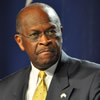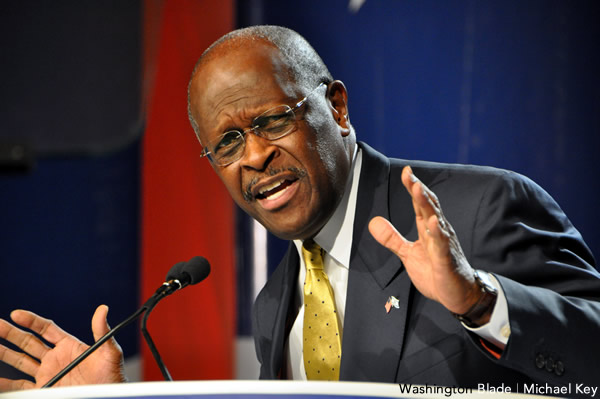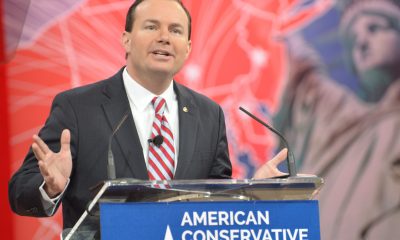National
Cain ignites firestorm with remarks on gays
Surging in polls, pizza magnate says homosexuality a choice

Republican presidential candidate Herman Cain made headlines this week, after saying that homosexuality is a choice, just as a new poll showed him moving into a tie for second place for the GOP nomination.
Cain, former CEO of Godfather’s Pizza, came under fire from LGBT advocates for indicating on Tuesday he believes people can choose their sexual orientation.
During an appearance on ABC’s “The View,” when asked by host Joy Behar whether he believes being gay is a choice, Cain replied, “Yes.”
“Well, you show me the science that it’s not and I’ll be persuaded,” Cain said. “Right now it’s my opinion against the opinions of others who feel differently. That’s just a difference of opinions.”
Cain’s remarks ignited a firestorm among many LGBT groups who called on the presidential hopeful — as well as other GOP candidates — to repudiate his remarks.
Joe Solmonese, president of the Human Rights Campaign, said in a statement that Cain’s remarks are “frankly, jaw-dropping and certainly unbecoming of a presidential hopeful.”
“Leading medical organizations, including the American Psychological Association, the American Medical Association and the American Psychiatric Association, all speak with a loud and clear voice — implying that someone’s sexual orientation can be chosen or changed is dangerous,” Solmonese said.
Solmonese said HRC is eager to connect Cain with medical professionals at these association to guide him through the basic science he said he seeks.
Jack Drescher, a distinguished fellow of the American Psychiatric Association and a member of the DSM-5 Workgroup on sexual and gender identity disorders, said he’s willing to meet with Cain to talk about the medical aspects of the issue.
“Herman Cain’s opinion that being gay is a choice has no basis in current scientific thinking,” Drescher said. “Not only is homosexuality ‘not a choice,’ as most efforts to try and change a person’s sexual orientation fail, but some attempts to change can cause harm and damage to an individual’s well-being.”
LGBT groups representing conservative and Republican interests had different takes on Cain’s remarks.
R. Clarke Cooper, executive director of Log Cabin Republicans, also criticized Cain and said the organization would be happy to show him the science proving sexual orientation isn’t a choice.
“An individual’s orientation is no more a choice than the color of his skin or whether he is left-handed, and too many people have been hurt because of failed attempts to change the way they were born,” Cooper said.
But Chris Barron, chair of GOProud, defended Cain and said his remarks don’t reflect the candidate’s true position on LGBT issues.
“The attacks levied by the gay left and their allies at Log Cabin against Mr. Cain are despicable,” Cain said. “My partner and I have sat down with Herman Cain and talked with him about issues that are important to gay people, and I can tell you first hand that anyone or any organization that claims that Herman Cain is anti-gay is simply lying or doesn’t know the man at all.”
The attacks on Cain come as a new Washington Post/ABC News poll published Tuesday finds him gaining ground among the GOP candidates, with former Massachusetts Gov. Mitt Romney once again at the head of the pack.
Among responders who leaned Republican, Romney led the pack with 21 points and Cain was tied with Texas Gov. Rick Perry at 14 points. Among all registered voters, Romney led with 20 points while Cain and Perry both had 15 points.
Once the front-runner upon his entry into the race, Perry is now tied for second-place with Cain. The Washington Post reported Perry’s slide comes after “several uneven performances” in presidential debates and in response to renewed media emphasis on immigration policies in his state. In Texas, colleges allow the children of illegal immigrants to pay in-state tuition rates.
Sean Theriault, a gay political scientist at the University of Texas, Austin, dismissed a reading of the poll as showing new strength for Romney.
Theriault noted Romney’s numbers hadn’t changed since earlier polling and the Massachusetts governor is only ahead now because of falling numbers for Perry.
“Perry is not doomed,” Theriault said. “Quite the contrary. A strong debate performance, a couple of good weeks of positive news and he’d be back on top. Romney’s numbers have been at 25 since the day he dropped out of the Republican primary in 2008. That’s a pretty strong ceiling effect.”
In related news, two high-profile Republicans who were thought to be possible entries in the presidential race officially announced they wouldn’t seek the nomination in 2012.
Former Alaska Gov. Sarah Palin, the GOP vice-presidential nominee in 2008, announced in a letter to supporters on Wednesday that she wouldn’t seek the nomination for the White House in 2012.
“I believe that at this time I can be more effective in a decisive role to help elect other true public servants to office from the nation’s governors to congressional seats and the presidency,” Palin said.
New Jersey Gov. Chris Christie also announced this week that he wouldn’t join the pack of Republican candidates seeking to oust President Obama from the White House.
“Now is not my time,” said Christie at a news conference in Trenton, N.J., adding, “New Jersey, whether you like it or not, you’re stuck with me.”
Christie is reviled by many LGBT rights supporters for having pledged to veto any legislation that would legalize same-sex marriage in New Jersey.
But in January, Christie signed into law one of the nation’s strongest anti-bullying bills. The law was inspired by the death of Rutgers University student Tyler Clementi, who committed suicide after his roommate secretly recorded a sexual encounter he had with another man.
Pennsylvania
Malcolm Kenyatta could become the first LGBTQ statewide elected official in Pa.
State lawmaker a prominent Biden-Harris 2024 reelection campaign surrogate

Following his win in the Democratic primary contest on Wednesday, Pennsylvania state Rep. Malcolm Kenyatta, who is running for auditor general, is positioned to potentially become the first openly LGBTQ elected official serving the commonwealth.
In a statement celebrating his victory, LGBTQ+ Victory Fund President Annise Parker said, “Pennsylvanians trust Malcolm Kenyatta to be their watchdog as auditor general because that’s exactly what he’s been as a legislator.”
“LGBTQ+ Victory Fund is all in for Malcolm, because we know he has the experience to win this race and carry on his fight for students, seniors and workers as Pennsylvania’s auditor general,” she said.
Parker added, “LGBTQ+ Americans are severely underrepresented in public office and the numbers are even worse for Black LGBTQ+ representation. I look forward to doing everything I can to mobilize LGBTQ+ Pennsylvanians and our allies to get out and vote for Malcolm this November so we can make history.”
In April 2023, Kenyatta was appointed by the White House to serve as director of the Presidential Advisory Commission on Advancing Educational Equity, Excellence and Economic Opportunity for Black Americans.
He has been an active surrogate in the Biden-Harris 2024 reelection campaign.
The White House
White House debuts action plan targeting pollutants in drinking water
Same-sex couples face higher risk from environmental hazards

Headlining an Earth Day event in Northern Virginia’s Prince William Forest on Monday, President Joe Biden announced the disbursement of $7 billion in new grants for solar projects and warned of his Republican opponent’s plans to roll back the progress his administration has made toward addressing the harms of climate change.
The administration has led more than 500 programs geared toward communities most impacted by health and safety hazards like pollution and extreme weather events.
In a statement to the Washington Blade on Wednesday, Brenda Mallory, chair of the White House Council on Environmental Quality, said, “President Biden is leading the most ambitious climate, conservation, and environmental justice agenda in history — and that means working toward a future where all people can breathe clean air, drink clean water, and live in a healthy community.”
“This Earth Week, the Biden-Harris Administration announced $7 billion in solar energy projects for over 900,000 households in disadvantaged communities while creating hundreds of thousands of clean energy jobs, which are being made more accessible by the American Climate Corps,” she said. “President Biden is delivering on his promise to help protect all communities from the impacts of climate change — including the LGBTQI+ community — and that we leave no community behind as we build an equitable and inclusive clean energy economy for all.”
Recent milestones in the administration’s climate policies include the U.S. Environmental Protection Agency’s issuance on April 10 of legally enforceable standard for detecting and treating drinking water contaminated with polyfluoroalkyl substances.
“This rule sets health safeguards and will require public water systems to monitor and reduce the levels of PFAS in our nation’s drinking water, and notify the public of any exceedances of those levels,” according to a White House fact sheet. “The rule sets drinking water limits for five individual PFAS, including the most frequently found PFOA and PFOS.”
The move is expected to protect 100 million Americans from exposure to the “forever chemicals,” which have been linked to severe health problems including cancers, liver and heart damage, and developmental impacts in children.
An interactive dashboard from the United States Geological Survey shows the concentrations of polyfluoroalkyl substances in tapwater are highest in urban areas with dense populations, including cities like New York and Los Angeles.
During Biden’s tenure, the federal government has launched more than 500 programs that are geared toward investing in the communities most impacted by climate change, whether the harms may arise from chemical pollutants, extreme weather events, or other causes.
New research by the Williams Institute at the UCLA School of Law found that because LGBTQ Americans are likelier to live in coastal areas and densely populated cities, households with same-sex couples are likelier to experience the adverse effects of climate change.
The report notes that previous research, including a study that used “national Census data on same-sex households by census tract combined with data on hazardous air pollutants (HAPs) from the National Air Toxics Assessment” to model “the relationship between same-sex households and risk of cancer and respiratory illness” found “that higher prevalence of same-sex households is associated with higher risks for these diseases.”
“Climate change action plans at federal, state, and local levels, including disaster preparedness, response, and recovery plans, must be inclusive and address the specific needs and vulnerabilities facing LGBT people,” the Williams Institute wrote.
With respect to polyfluoroalkyl substances, the EPA’s adoption of new standards follows other federal actions undertaken during the Biden-Harris administration to protect firefighters and healthcare workers, test for and clean up pollution, and phase out or reduce use of the chemicals in fire suppressants, food packaging, and federal procurement.
Maine
Maine governor signs transgender, abortion sanctuary bill into law
Bomb threats made against lawmakers before measure’s passage

BY ERIN REED | On Tuesday, Maine Gov. Janet Mills signed LD 227, a sanctuary bill that protects transgender and abortion providers and patients from out-of-state prosecution, into law.
With this action, Maine becomes the 16th state to explicitly protect trans and abortion care in state law from prosecution. This follows several bomb threats targeting state legislators after social media attacks from far-right anti-trans influencers such as Riley Gaines and Chaya Raichik of Libs of TikTok.
An earlier version of the bill failed in committee after similar attacks in January. Undeterred, Democrats reconvened and added additional protections to the bill before it was passed into law.
The law is extensive. It asserts that gender-affirming care and reproductive health care are “legal rights” in Maine. It states that criminal and civil actions against providers and patients are not enforceable if the provision or access to that care occurred within Maine’s borders, asserting jurisdiction over those matters.
It bars cooperation with out-of-state subpoenas and arrest warrants for gender-affirming care and abortion that happen within the state. It even protects doctors who provide gender-affirming care and abortion from certain adverse actions by medical boards, malpractice insurance, and other regulating entities, shielding those providers from attempts to economically harm them through out-of-state legislation designed to dissuade them from providing care.
You can see the findings section of the bill here:
The bill also explicitly enshrines the World Professional Association of Transgender Health’s Standards of Care, which have been the target of right-wing disinformation campaigns, into state law for the coverage of trans healthcare:
The bill is said to be necessary due to attempts to prosecute doctors and seek information from patients across state lines. In recent months, attorneys general in other states have attempted to obtain health care data on trans patients who traveled to obtain care. According to the U.S. Senate Finance Committee, attorneys general in Tennessee, Indiana, Missouri, and Texas attempted to obtain detailed medical records “to terrorize transgender teens in their states … opening the door to criminalizing women’s private reproductive health care choices.”
The most blatant of these attempts was from the attorney general of Texas, who, according to the Senate Finance Committee, “sent demands to at least two non-Texas entities.” One of these entities was Seattle Children’s Hospital, which received a letter threatening administrators with arrest unless they sent data on Texas patients traveling to Seattle to obtain gender-affirming care.
Seattle Children’s Hospital settled that case out of court this week, agreeing to withdraw its Texas business registration in return for Texas dropping its investigation. This likely will have no impact on Seattle Children’s Hospital, which has stated it did not treat any youth via telemedicine or in person in Texas; the hospital will be able to continue treating Texas youth who travel outside of Texas to obtain their care. That settlement was likely compelling due to a nearly identical law in Washington that barred out-of-state investigations on trans care obtained solely in the state of Washington.
The bill has faced a rocky road to passage. A similar bill was debated in January, but after coming under intense attack from anti-trans activists who misleadingly called it a “transgender trafficking bill,” the bill was voluntarily withdrawn by its sponsor.
When LD 227 was introduced, it faced even more attacks from Gaines and Libs of TikTok. These attacks were followed by bomb threats that forced the evacuation of the legislature, promising “death to pedophiles” and stating that a bomb would detonate within a few hours in the capitol building.
Despite these threats, legislators strengthened both the abortion and gender-affirming care provisions and pressed forward, passing the bill into law. Provisions found in the new bill include protecting people who “aid and assist” gender-affirming care and abortion, protections against court orders from other states for care obtained in Maine, and even protections against adverse actions by health insurance and malpractice insurance providers, which have been recent targets of out-of-state legislation aimed at financially discouraging doctors from providing gender-affirming care and abortion care even in states where it is legal.
See a few of the extensive health insurance and malpractice provisions here:
Speaking about the bill, Gia Drew, executive director of Equality Maine, said in a statement, “We are thrilled to see LD 227, the shield bill, be signed into law by Gov. Mills. Thanks to our pro equality and pro reproductive choice elected officials who refused to back down in the face of disinformation. This bill couldn’t come into effect at a better time, as more than 40 percent of states across the country have either banned or attempted to block access to reproductive care, which includes abortions, as well as transgender healthcare for minors. Thanks to our coalition partners who worked tirelessly to phone bank, lobby, and get this bill over the finish line to protect community health.”
Destie Hohman Sprague of the Maine Women’s Lobby celebrated the passage of the bill despite threats of violence, saying in a statement, “A gender-just Maine ensures that all Mainers have access to quality health care that supports their mental and physical wellbeing and bodily autonomy, including comprehensive reproductive and gender-affirming care. We celebrate the passage of LD 227, which helps us meet that goal. Still, the patterns of violence and disinformation ahead of the vote reflected the growing connections between misogyny, extremism, and anti-democratic threats and actions. We must continue to advocate for policies that protect bodily autonomy, and push back against extremist rhetoric that threatens our states’ rights and our citizens’ freedoms.”
The decision to pass the legislation comes as the Biden administration released updated HIPAA protections that protect “reproductive health care” from out-of-state prosecutions and investigations.
Although the definition of “reproductive health care” is broad in the new HIPAA regulations, it is uncertain whether they will include gender-affirming care. For at least 16 states, though, gender-affirming care is now explicitly protected by state law and shielded from out-of-state legislation, providing trans people and those seeking abortions with protections as the fight increasingly crosses state lines.
****************************************************************************

Erin Reed is a transgender woman (she/her pronouns) and researcher who tracks anti-LGBTQ+ legislation around the world and helps people become better advocates for their queer family, friends, colleagues, and community. Reed also is a social media consultant and public speaker.
******************************************************************************************
The preceding article was first published at Erin In The Morning and is republished with permission.






















